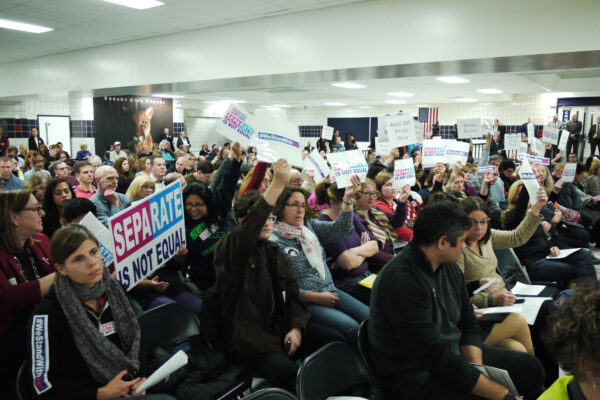Suburban School District says that it will discriminate against transgender students by denying them gender-appropriate locker room facilities in violation of Title IX
CHICAGO – A suburban Chicago school district announced today that it will disregard the United States Department of Education’s finding that the school has violated federal law by denying a student access to gender-appropriate locker rooms for changing clothes, simply because the student is transgender. In response to a complaint filed by the ACLU for a female student, the Department found that the school discriminated against the young woman in denying her access to the girls’ locker rooms for gym and competitive sports.
In the last two years, the Department of Education and the U.S. Department of Justice have entered into two binding settlement agreements with school districts requiring them to allow transgender students to use the restrooms and other sex-segregated facilities consistent with their gender identity. In this case, the Department’s Office of Civil Rights decided that the district violated a transgender student access to locker room facilities consistent with the student’s gender, but the district refused to cease its illegal conduct.
Young people have argued for years that forcing them to use a separate restroom or locker room facility from other students, instead of allowing them to use the gender-appropriate restrooms and locker rooms that other students use, ostracizes and stigmatizes them. That is precisely what the high school of the student, located in suburban School District 211, has done here. Transgender young people are already at greater risk for bullying, harassment, discrimination, and being forced out of school. Discriminatory policies such as the District’s put these vulnerable students at greater risk of harm. That’s why hundreds of school districts around the country, including schools and districts in Illinois, allow transgender students to use facilities based on their gender identity. Their doing so hasn’t resulted in any problems. If any student is uncomfortable using a communal restroom or locker room or feels the need for increased privacy, the school should accommodate that student by allowing them to use a separate facility. However, schools may not use claims of student privacy as a pretext to discriminate against transgender students.
The Department of Education has made it clear to District 211 that denying a transgender student equal access to gender-appropriate locker rooms is sex discrimination in violation federal law. District 211 has chosen, however, to abandon efforts to reach an agreement with the Department to address the violation and has announced that it will continue discriminating against transgender students.
The decision of the Office of Civil Rights results from a complaint filed by the ACLU of Illinois with the Department of Education. The young woman represented by the ACLU has identified as a female since a very early age and has been living full-time as a girl for several years. When she started high school, she and her parents met with school officials to request that she be treated as a female in all ways, including in her participation in sports, as well as restroom and locker room access. While making some accommodations, her school denied her use of the female locker rooms. Instead, she was directed to a separate bathroom for changing located down a long hallway from the gym.
Being separated from her classmates and teammates stigmatized the student and made her feel different. Her parents began to advocate for her, urging school officials to reverse this decision. After those efforts were unsuccessful, the parents reached out to an attorney at the ACLU of Illinois who sent a letter outlining the illegality of school’s discriminatory conduct to no avail. Lawyers for the ACLU then filed the complaint with the Department of Education.
“Transgender students now are a part of everyday American life as society has become more accepting of all kinds of differences.” said John Knight of the ACLU of Illinois who represented the student in this matter. “Instead of ostracizing these students and singling them out from their fellow students, schools and communities need to embrace kids who are different and ensure that all are able to be safe, be themselves, and succeed in school.”
"It is puzzling that the school district has decided to elevate its misguided interpretation of 'privacy' over the fundamental principle of non-discrimination,” added Knight. “The school leadership's decision is a poor reflection on the community they represent."
Related Content

Department of Education stands with high school student who is transgender
Stay Informed
Sign up to be the first to hear about how to take action.
By completing this form, I agree to receive occasional emails per the terms of the ACLU’s privacy statement.
By completing this form, I agree to receive occasional emails per the terms of the ACLU’s privacy statement.

